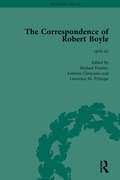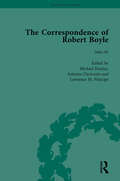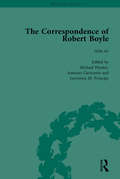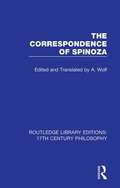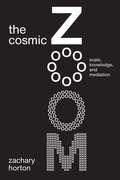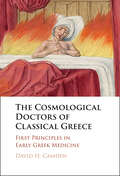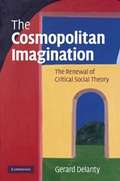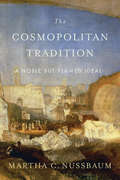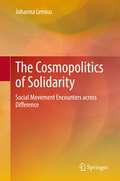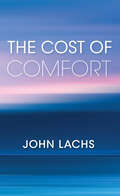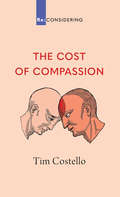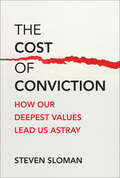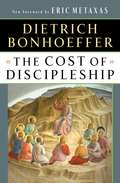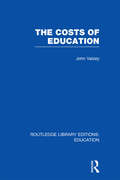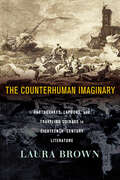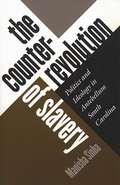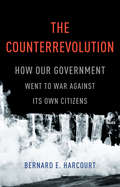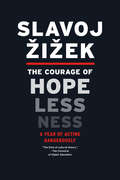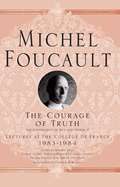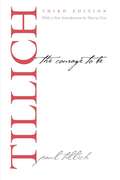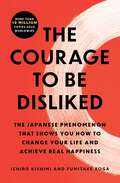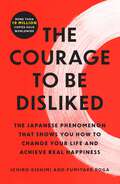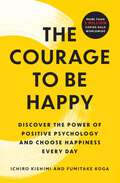- Table View
- List View
The Correspondence of Robert Boyle, 1636-1691 Vol 5
by Michael Hunter Antonio Clericuzio Lawrence M PrincipeRobert Boyle (1627-1691) was one of the most influential scientific and theological thinkers of his time. This is the first edition of his correspondence, transcribed from the original manuscripts. It is fully annotated, with an introduction and general index.
The Correspondence of Robert Boyle, 1636-1691 Vol 6
by Michael Hunter Antonio Clericuzio Lawrence M PrincipeRobert Boyle (1627-1691) was one of the most influential scientific and theological thinkers of his time. This is the first edition of his correspondence, transcribed from the original manuscripts. It is fully annotated, with an introduction and general index. Volume 6 covers the period of 1684–91.
The Correspondence of Robert Boyle, 1636–61 Vol 1
by Michael Hunter Antonio Clericuzio Lawrence M PrincipeRobert Boyle (1627-1691) was one of the most influential scientific and theological thinkers of his time. This is the first edition of his correspondence, transcribed from the original manuscripts. It is fully annotated, with an introduction and general index. The four volumes cover the time periods of Volume 1: 1936-91, Volume 2: 1662-5, Volume 3: 1666-7 and finally Volume 4 1668 to 77.
The Correspondence of Spinoza (Routledge Library Editions: 17th Century Philosophy)
by A. WolfFirst published in 1928, The Correspondence of Spinoza is deeply interesting in many ways. It presents a pageant of the leading types of seventeenth-century mentality. It affords contemporary glimpses of important scientific researches and discoveries. It brings us into touch with some of the social and political events and tendencies of the period. This book includes correspondent letters containing things of first-rate importance for the correct interpretation of the philosophy of Spinoza.
The Cosmic Zoom: Scale, Knowledge, and Mediation
by Zachary HortonIn The Powers of Ten by Charles and Ray Eames, a view of two people enjoying a picnic zooms up and away to show their surroundings, moving progressively farther into space, then zooms back in for a close-up of the hand of the picnicker, travelling deep into the microscopic realm. This is one of the most iconic examples of the “cosmic zoom,” a trope that has influenced countless media forms over the past seventy years. Horton uses the cosmic zoom as a starting point to develop a cross-disciplinary theory of scale as mediated difference. He considers the origins of our notions of scale, how scalar mediation functions differently in analog and digital modes, and how cosmic zoom media has influenced scientific and popular views of the world. Analyzing literature, film, digital media, and database history, Horton establishes a much-needed framework for thinking about scale across multiple domains and disciplines.
The Cosmological Doctors of Classical Greece: First Principles in Early Greek Medicine
by David H. CamdenWhy did some doctors in Classical Greece feel compelled to study the universe as a whole? How could cosmological principles be employed in clinical practice? This book explores the works of the cosmological doctors, such as On Breaths, On Flesh, and On Regimen, and argues that they form part of a much broader reorganization of medical knowledge in the fifth and fourth centuries BCE. These healers used cosmological principles as a supplement to, rather than a replacement of, more traditional approaches to health and disease, creating theories about the cosmos whose obscurities can best be understood as the products of medical thinking. Through fresh readings of many ancient sources, the book revises customary views of the intersections between medicine and cosmology in Classical Greece and advances our understanding of one of the most remarkable periods in the history of ancient thought.
The Cosmopolitan Imagination: The Renewal of Critical Social Theory
by Gerard DelantyGerard Delanty provides a comprehensive assessment of the idea of cosmopolitanism in social and political thought which links cosmopolitan theory with critical social theory. He argues that cosmopolitanism has a critical dimension which offers a solution to one of the weaknesses in the critical theory tradition: failure to respond to the challenges of globalization and intercultural communication. Critical cosmopolitanism, he proposes, is an approach that is not only relevant to social scientific analysis but also normatively grounded in a critical attitude. Delanty's argument for a critical, sociologically oriented cosmopolitanism aims to avoid, on the one hand, purely normative conceptions of cosmopolitanism and, on the other, approaches that reduce cosmopolitanism to the empirical expression of diversity. He attempts to take cosmopolitan theory beyond the largely Western context with which it has generally been associated, claiming that cosmopolitan analysis must now take into account non-Western expressions of cosmopolitanism.
The Cosmopolitan Tradition: A Noble but Flawed Ideal
by Martha C. NussbaumThe cosmopolitan political tradition defines people not according to nationality, family, or class but as equally worthy citizens of the world. Martha Nussbaum pursues this “noble but flawed” vision, confronting its inherent tensions over material distribution, differential abilities, and the ideological conflicts inherent to pluralistic societies.
The Cosmopolitics of Solidarity: Social Movement Encounters across Difference
by Johanna LeiniusThis volume discusses how commonality and difference are negotiated across heterogeneous social movements in Latin America, especially Peru. It applies cosmopolitics as an analytical lens to understand the intricacies of social movement encounters across difference, without imposing colonial hierarchies or categorizations. The author blends multiple theoretical approaches—such as social movement research, postcolonial feminism, and post-foundational discourse theory—with ethnographic insights to develop a theory of cosmopolitical solidarity. Providing a transnational and intersectional perspective on the politics of social justice in a postcolonial context, this book will appeal to students of social movements, gender studies, racism, Latin American studies, and international relations, as well as practitioners involved in activism, social work, or international cooperation.
The Cost of Comfort (American Philosophy)
by John LachsWhy do we feel empty when our lives seem so full? A philosopher&’s &“clear, engaging reflection&” on the psychic risks of today&’s world (John T. Lysaker, author of After Emerson). While comfort has not always reached everyone evenly, most of us who live in the United States today reap the benefits of modern life. We live longer, we eat better food, we have access to good medical care, and we can stay in touch with loved ones who are far away. Yet, as philosopher John Lachs observes, these comfortable lives come at a cost: our increasing unhappiness. Irresponsible behavior, including by those in positions of power in governments and corporations, only increases and multiplies feelings of bitterness and disaffection. In this book, Lachs argues that this dizzyingly complex world often inspires isolation, and that deeper engagement with it is required in order to dispel our growing psychic distance. Lachs advocates for mediation and champions education, advertising, openness, and transparency to help individuals understand the roles they play in society and to nullify claims to blamelessness. Lachs suggests new rules for responsibility and argues that examining and understanding the consequences of one&’s actions is imperative to overcoming the ills and problems of the modern world—and to find the fulfillment we seek. &“A very clear, engaging reflection on a genuine contemporary issue: deep feelings of disengagement and bewilderment about how to live responsibly in an almost overwhelmingly complex world.&” —John T. Lysaker, author of After Emerson
The Cost of Compassion (Re: CONSIDERING)
by Tim CostelloRe:CONSIDERING invites you to look at what’s familiar from an unfamiliar angle. To consider how we consider things – and how to do it better.Who’s in favour of compassion?Pretty much everybody, actually. Left or right, religious or not, nobody seems to have a bad word to say about compassion.So why do we have so much trouble addressing the conflict, inequality, and suffering in our world?Ranging from the streets of St Kilda to the slums of Delhi, from Plato to Nietzsche, the Dalai Lama to Peter Singer, and from Seinfeld to the Good Samaritan, Tim Costello appeals to our common humanity – and takes an unflinching look at how costly compassion can be.
The Cost of Conviction: How Our Deepest Values Lead Us Astray
by Steven SlomanA timely and important perspective on how people frame decisions and how relying on sacred values unwittingly leads to social polarization.When you are faced with a decision, do you consider the best outcome, or do you consider your deepest values about which actions are appropriate? The Cost of Conviction contrasts these two primary strategies for making decisions: consequentialism or prioritizing one&’s sacred values. Steven Sloman argues that, while both modes of decision making are necessary tools for a good decision maker, people err by deploying sacred values more often than they should, especially when it comes to sociopolitical issues. As a result, we oversimplify, grow disgusted and angry, and act in ways that contribute to social polarization. In this book, Sloman provides a new understanding of today&’s societal ills and grounds that understanding in science.Drawing on historical and current examples of the two decision-making strategies in action, the author provides a thorough overview of the psychology of decision making, including work on judgment, conscious and unconscious decision-making processes, the roles of emotion, and even an analysis of habit and addiction. With its unique emphasis on sacred values, The Cost of Conviction is an eye-opening must-read for all decision makers, especially those who wish to understand judgment, social decision making, and leadership.
The Cost of Discipleship (Shepherd's Notes Ser.)
by Dietrich BonhoefferOne of the most important theologians of the twentieth century illuminates the relationship between ourselves and the teachings of Jesus in this classic text on ethics, humanism, and civic duty.What can the call to discipleship, the adherence to the word of Jesus, mean today to the businessman, the soldier, the laborer, or the aristocrat? What did Jesus mean to say to us? What is his will for us today? Drawing on the Sermon on the Mount, Dietrich Bonhoeffer answers these timeless questions by providing a seminal reading of the dichotomy between "cheap grace" and "costly grace." "Cheap grace," Bonhoeffer wrote, "is the grace we bestow on ourselves...grace without discipleship....Costly grace is the gospel which must be sought again and again, the girl which must be asked for, the door at which a man must know....It is costly because it costs a man his life, and it is grace because it gives a man the only true life." The Cost of Discipleship is a compelling statement of the demands of sacrifice and ethical consistency from a man whose life and thought were exemplary articulations of a new type of leadership inspired by the Gospel, and imbued with the spirit of Christian humanism and a creative sense of civic duty.
The Costs and Benefits of Animal Experiments
by Andrew KnightA comprehensive review of recent scientific evidence examining the contributions of animal experimentation to human healthcare. The book also explores toxicity prediction, animal use during life and health sciences education, impacts on student attitudes toward animals, and the extent to which animals suffer in laboratories.
The Costs of Education (Routledge Library Editions: Education)
by John VaizeyThis is the first book which authoritatively reviews the UK expenditure on education from 1920 – 1955, both by local authorities and private schools. The book takes the main elements of education in turn and discusses them in detail. There are original studies of local authority finance, of teachers’ pay and of the economics of private education. It examines educational spending by social class and compares the growth of educational services in England and Wales, Scotland and Northern Ireland.
The Counterhuman Imaginary: Earthquakes, Lapdogs, and Traveling Coinage in Eighteenth-Century Literature
by Laura BrownThe Counterhuman Imaginary proposes that alongside the historical, social, and institutional structures of human reality that seem to be the sole subject of the literary text, an other-than-human world is everywhere in evidence. Laura Brown finds that within eighteenth-century British literature, the human cultural imaginary can be seen, equally, as a counterhuman imaginary—an alternative realm whose scope and terms exceed human understanding or order.Through close readings of works by Daniel Defoe, Jonathan Swift, and Alexander Pope, along with lapdog lyrics, circulation narratives that give agency to inanimate objects like coins and carriages, and poetry about the Lisbon earthquake of 1755, Brown traces the ways presence and power of the nonhuman—weather, natural disasters, animals, even the concept of love—not only influence human creativity, subjectivity, and history but are inseparable from them. Traversing literary theory, animal studies, new materialism, ecocriticism, and affect theory, The Counterhuman Imaginary offers an original repudiation of the centrality of the human to advance an integrative new methodology for reading chaos, fluidity, force, and impossibility in literary culture.
The Counterrevolution of Slavery
by Manisha SinhaIn this comprehensive analysis of politics and ideology in antebellum South Carolina, Manisha Sinha offers a provocative new look at the roots of southern separatism and the causes of the Civil War. Challenging works that portray secession as a fight for white liberty, she argues instead that it was a conservative, antidemocratic movement to protect and perpetuate racial slavery.Sinha discusses some of the major sectional crises of the antebellum era--including nullification, the conflict over the expansion of slavery into western territories, and secession--and offers an important reevaluation of the movement to reopen the African slave trade in the 1850s. In the process she reveals the central role played by South Carolina planter politicians in developing proslavery ideology and the use of states' rights and constitutional theory for the defense of slavery. Sinha's work underscores the necessity of integrating the history of slavery with the traditional narrative of southern politics. Only by taking into account the political importance of slavery, she insists, can we arrive at a complete understanding of southern politics and the enormity of the issues confronting both northerners and southerners on the eve of the Civil War.
The Counterrevolution: How Our Government Went To War Against Its Own Citizens
by Bernard E. HarcourtA distinguished political theorist sounds the alarm about the counterinsurgency strategies used to govern AmericansMilitarized police officers with tanks and drones. Pervasive government surveillance and profiling. Social media that distract and track us. All of these, contends Bernard E. Harcourt, are facets of a new and radical governing paradigm in the United States--one rooted in the modes of warfare originally developed to suppress anticolonial revolutions and, more recently, to prosecute the war on terror.The Counterrevolution is a penetrating and disturbing account of the rise of counterinsurgency, first as a military strategy but increasingly as a way of ruling ordinary Americans. Harcourt shows how counterinsurgency's principles--bulk intelligence collection, ruthless targeting of minorities, pacifying propaganda--have taken hold domestically despite the absence of any radical uprising. This counterrevolution against phantom enemies, he argues, is the tyranny of our age. Seeing it clearly is the first step to resisting it effectively.
The Courage of Hopelessness: Chronicles Of A Year Of Acting Dangerously
by Slavoj ZizekIn THE COURAGE OF HOPELESSNESS, maverick philosopher Slavoj Zizek returns to explore today's ideological, political and economic battles, and asks whether radical change is possible.In these troubled times, even the most pessimistic diagnosis of our future ends with an uplifting hint that things might not be as bad as all that, that there is light at the end of the tunnel. Yet, argues Slavoj Žižek, it is only when we have admitted to ourselves that our situation is completely hopeless - that the light at the end of the tunnel is in fact the headlight of a train - that fundamental change can be brought about.
The Courage of Truth (Michel Foucault, Lectures at the Collège de France)
by Michel Foucault Graham BurchellThe Courage of the Truth is the last course that Michel Foucault delivered at the College de France before his death in 1984. In this course, he continues the theme of the previous year's lectures in exploring the notion of "truth-telling" in politics to establish a number of ethically irreducible conditionsbased on courage and conviction.
The Courage to Be
by Paul TillichThe Courage to Be has become a classic of twentieth-century religious and philosophical thought. The great Christian existentialist thinker Paul Tillich describes the dilemma of modern man and points a way to the conquest of the problem of anxiety.
The Courage to Be Disliked: The Japanese Phenomenon That Shows You How to Change Your Life and Achieve Real Happiness
by Ichiro Kishimi Fumitake KogaThe Life-Changing Magic of Tidying Up for the mind, The Courage to Be Disliked is the Japanese phenomenon that shows you how to free yourself from the shackles of past experiences and others’ expectations to achieve real happiness.The Courage to Be Disliked, already an enormous bestseller in Asia with more than 3.5 million copies sold, demonstrates how to unlock the power within yourself to be the person you truly want to be. Using the theories of Alfred Adler, one of the three giants of twentieth century psychology, this book follows an illuminating conversation between a philosopher and a young man. The philosopher explains to his pupil how each of us is able to determine our own life, free from the shackles of past experiences, doubts, and the expectations of others. It’s a way of thinking that is deeply liberating, allowing us to develop the courage to change, and to ignore the limitations that we and those around us have placed on ourselves. The result is a book that is both highly accessible and profound in its importance. Millions have already read and benefitted from its wisdom. This is a truly special book in the vein of Marie Kondo’s The Life-Changing Magic of Tidying Up but for the mind. Those ready to embrace the insights and liberation promised by The Courage to Be Disliked will come to a deeper understanding of themselves and others, and find the inspiration to take the reins of their own life.
The Courage to Be Disliked: The Japanese Phenomenon That Shows You How to Change Your Life and Achieve Real Happiness
by Ichiro Kishimi Fumitake KogaThe Life-Changing Magic of Tidying Up for the mind, The Courage to Be Disliked is the Japanese phenomenon that shows you how to free yourself from the shackles of past experiences and others&’ expectations to achieve real happiness.The Courage to Be Disliked, already an enormous bestseller in Asia with more than 3.5 million copies sold, demonstrates how to unlock the power within yourself to be the person you truly want to be. Using the theories of Alfred Adler, one of the three giants of twentieth century psychology, this book follows an illuminating conversation between a philosopher and a young man. The philosopher explains to his pupil how each of us is able to determine our own life, free from the shackles of past experiences, doubts, and the expectations of others. It&’s a way of thinking that is deeply liberating, allowing us to develop the courage to change, and to ignore the limitations that we and those around us have placed on ourselves. The result is a book that is both highly accessible and profound in its importance. Millions have already read and benefitted from its wisdom. This is a truly special book in the vein of Marie Kondo&’s The Life-Changing Magic of Tidying Up but for the mind. Those ready to embrace the insights and liberation promised by The Courage to Be Disliked will come to a deeper understanding of themselves and others, and find the inspiration to take the reins of their own life.
The Courage to Be Disliked: The Japanese Phenomenon That Shows You How to Change Your Life and Achieve Real Happiness
by Ichiro Kishimi Fumitake KogaAn international bestseller and TikTok sensation with more than 10 million copies sold worldwide, The Courage to Be Disliked is a transformative and practical guide to personal happiness and self-fulfillment.Now you can unlock your full potential and free yourself from the shackles of past traumas and societal expectations to find true personal happiness. Based on the theories of renowned psychologist Alfred Adler, this book guides you through the principles of self-forgiveness, self-care, and mind decluttering in a straightforward, easy-to-digest style that&’s accessible to all.The Courage to Be Disliked unfolds as a dialogue between a philosopher and a young man, who, over the course of five enriching conversations, realizes that each of us is in control of our life&’s direction, independent of past burdens and expectations of others. Wise, empowering, and profoundly liberating, this book is a life-changing experience that shows you a path to lasting happiness and how to finally be the person you truly want to be. Millions are already benefiting from its teachings—and you can be next.
The Courage to Be Happy: Discover the Power of Positive Psychology and Choose Happiness Every Day
by Ichiro Kishimi Fumitake KogaIn this follow-up to the international bestseller and TikTok sensation The Courage to Be Disliked, discover how to reconnect with your true self, experience true happiness, and live the life you want. What if one simple choice could unlock your destiny? Already a major international bestseller, this eye-opening and accessible follow-up to the &“compelling&” (Marc Andreessen) worldwide phenomenon The Courage to be Disliked shares the powerful teachings of Alfred Adler, one of the giants of 19th-century psychology, through another illuminating dialogue between the philosopher and the young man. Three years after their first conversation, the young man finds himself disillusioned and disappointed, convinced Adler&’s teachings only work in theory, not in practice. But through further discussions between the philosopher and the young man, they deepen their own understandings of Adler&’s powerful teachings, and learn the tools needed to apply Adler&’s teachings to the chaos of everyday life. To be read on its own or as a companion to the bestselling first book, The Courage to Be Happy reveals a bold new way of thinking and living, empowering you to let go of the shackles of past trauma and the expectations of others, and to use this freedom to create the life you truly desire. Plainspoken yet profoundly moving, reading The Courage to Be Happy will light a torch with the power to illuminate your life and brighten the world as we know it. Now you can discover the courage to choose happiness.
